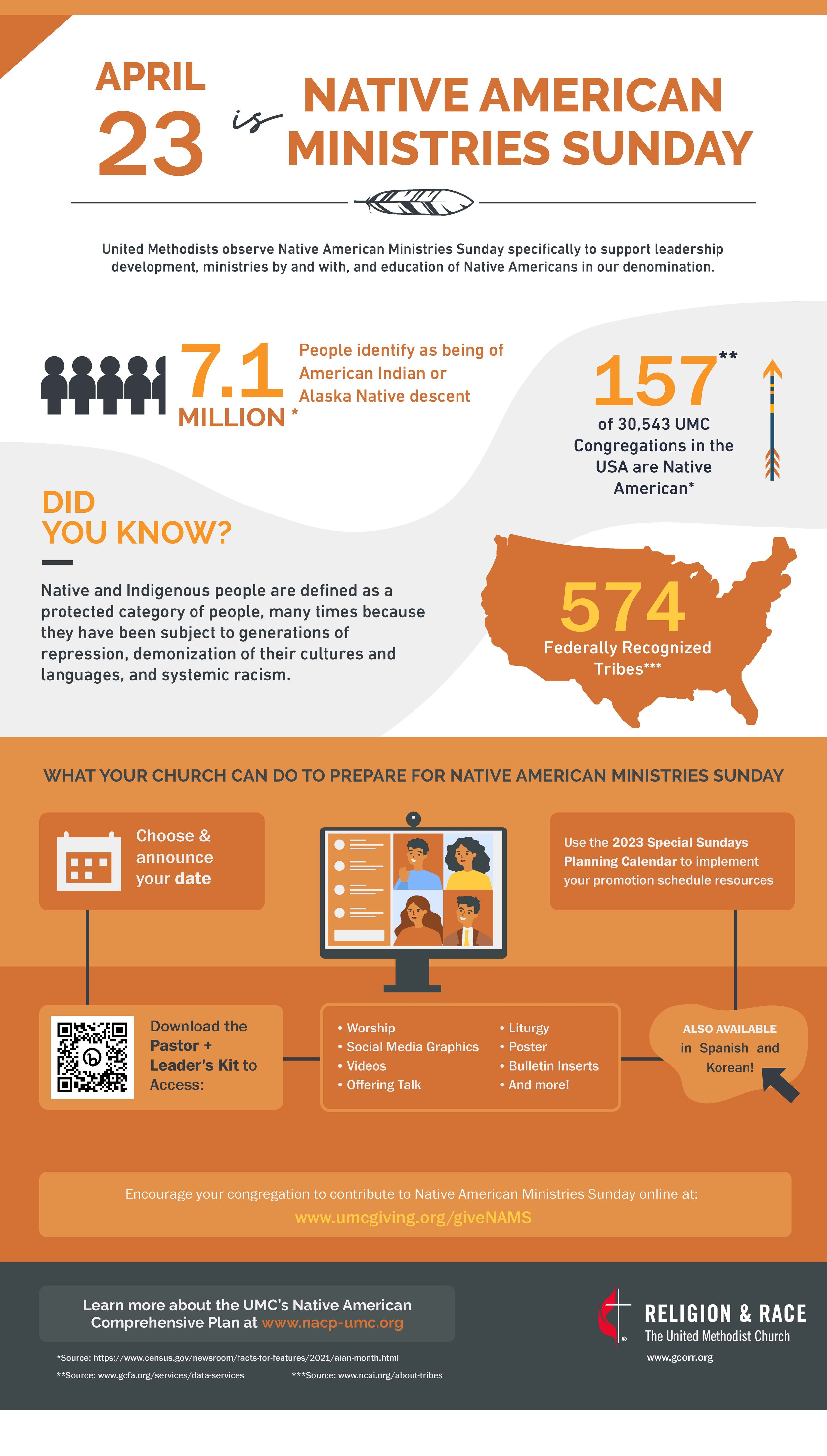April 23rd is Native American Ministries Sunday
Below the graphic you’ll find a full readout of the text it contains. This helps aid accessibility, particular for those using screen-reading software.
April 23 is Native American Ministries Sunday
United Methodists observe Native American Ministries Sunday specifically to support leadership development, ministries by and with, and education of Native Americans in our denomination.
7.1 million people identify as being of American Indiana or Alaska Native descent. (Source: https://www.census.gov/newsroom/facts-for-features/2021/aian-month.html)
157 of 30,543 UMC Congregations in the USA are Native American. (Source: https://www.gcfa.org/services/data-services)
Did you know? Native and Indigenous people are defined as a protected category of people, many times because they have been subject to generations of repression, demonization of their cultures and languages, and systemic racism.
There are 574 Federally Recognized Tribes (Source: https://www.ncai.org/about-tribes)
What your church can do to prepare for Native American Ministries Sunday:
Choose & announce your date
Download the Pastor & Leader’s Kit to access:
Worship
Liturgy
Social Media Graphics
Poster
Videos
Bulletin Inserts
Offering Talk
And More!
Also available in Spanish and Korean!
Use the 2023 Special Sundays Planning Calendar to implement your promotion schedule resources.
Encourage your congregation to contribute to Native American Ministries Sunday online at: www.umcgiving.org/giveNAMS
Learn more about the UMC’s Native American Comprehensive Plan at www.nacp-umc.org
United Methodists Observe Native American Ministries Sunday on April 23, 2023
Since 1989, United Methodist congregations have observed the third Sunday after Easter as Native American Ministries Sunday. The purpose is to elevate and support the contributions and voices of Native/Indigenous people in our church.
A special financial offering on this day goes to support specific ministries in annual conferences. More information and resources for Native American Ministries Sunday are available from United Methodist Communication.
Meanwhile, here are seven suggestions for congregations, individuals, and families to honor and undergird Native/Indigenous people:
Learn about Native people and their presence in your community. What tribal groups were original to your town? Which groups live in your area now? What concerns and contributions are Native leaders focused on? Ask to visit a reservation and listen to the people there.
Gain a greater awareness of national concerns pertaining to Native people. Consider visiting nativenewsonline.net to read national Native news stories and learn more about what is happening outside your community.
Delve into authentic history and stories of Native people. Many stories by non-Natives are romanticized and fictionalized and are based on a poor stereotype of indigenous people (think: stories about Pocahontas in animated movies and U.S. pop culture). Seek out books and other resources reflecting Native perspectives.
Pray for and support Native/Indigenous ministries, community groups, and businesses. In addition to giving on April 23, consider making a monthly or quarterly donation to Native American ministries and scholarships in your area. Or you can give to the denomination-wide Native American Comprehensive Plan here and the Native American International Caucus here.
Challenge appropriation and stereotypes. Fight cultural and institutional bias in language, word, and deed. Don’t wear traditional Native jewelry and clothing before learning whether they are intended for and appropriate for non-Native wearers. Check your use of pejorative sayings such as, “Indian giver.”
Contact your conference Committee on Native American Ministries (CONAM). Find out what members of this committee are working on in your conference and get involved.
Consider taking legislative action. Visit Establish the Truth and Healing Commission on Indian Boarding School Policies Act – BWC Advocacy (bwcaction.org) to learn more about how you can participate.
Additionally, here are books for children about Native Americans:
We Are Still Here! Native American Truths Everyone Should Know by Traci Sorrell (Charlesbridge, 2021)
We Are Water Protectors by Carole Lindstrom (2020, Roaring Book Press)
Native History for Kids: With 21 Activities by Karen Bush Gibson (Chicago Review Press, 2010)
The Very First Americans by Cara Ashrose (Grossett & Dunlap, 1993)
First White Frost by Homer Noley (Abingdon Press, 1991)
Massacre at Sand Creek by Gary Roberts (Abingdon Press, 2016)
Kill the Indian, Save the Man by Ward Churchill (City Lights Publishers, 2004)
An Indigenous People’s History of the United States by Roxanne Dunbar-Ortiz (Beacon Press, 2015)
Fry Bread: A Native American Family Story, a children’s book by Kevin Noble Maillard and Juana Martinez-Neal (Roaring Book Press, 2019)

